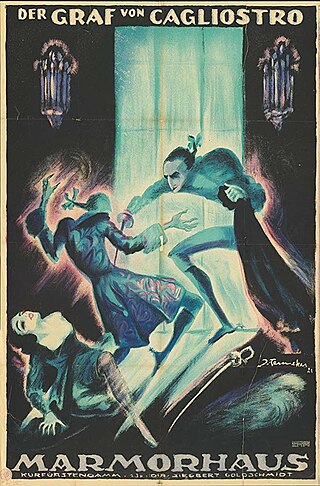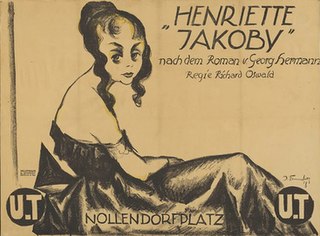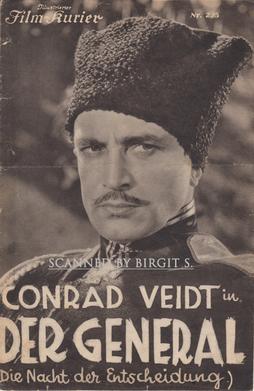
Hans Walter Conrad Veidt was an actor. He attracted early attention for his roles in the films Different from the Others (1919), The Cabinet of Dr. Caligari (1920), and The Man Who Laughs (1928). After a successful career in German silent films, where he was one of the best-paid stars of UFA, Veidt and his new Jewish wife Ilona Prager left Germany in 1933 after the Nazis came to power. The couple settled in Britain, where he took citizenship in 1939. Veidt subsequently appeared in many British films, including The Thief of Bagdad (1940). After immigrating to the United States around 1941, he was cast as Major Strasser in Casablanca (1942), his last film role to be released during his lifetime.

Lady Hamilton is a 1921 German silent historical film directed by Richard Oswald and starring Liane Haid, Conrad Veidt and Werner Krauss. The film depicts the love affair between the British Admiral Lord Nelson and Lady Emma Hamilton. It was based on two novels by Heinrich Vollrath Schumacher. A copy of the film exists in a Russian film archive.
Storm over Asia is a 1938 French drama film directed by Richard Oswald and starring Conrad Veidt, Sessue Hayakawa and Madeleine Robinson.

Fear is a 1917 German silent horror film written and directed by Robert Wiene and starring Bruno Decarli, Conrad Veidt and Bernhard Goetzke.

Should We Be Silent? is a 1926 German silent drama film directed by Richard Oswald and starring Conrad Veidt, Walter Rilla and Henri De Vries. It was made at the Johannisthal Studios in Berlin. The film's art direction was by Heinrich Richter-Berlin. The film exists only in fragmentary form.

Der Graf von Cagliostro is a 1920 silent film directed and co-written by Reinhold Schünzel and starring Schünzel, Anita Berber and Conrad Veidt. It depicts the life of the eighteenth century Italian mesmerist and occultist Alessandro Cagliostro, who called himself Cagliostro. The film is considered a lost film.
Nocturne of Love is a 1919 German silent historical film directed by Carl Boese and starring Conrad Veidt and Clementine Plessner. It portrays the life of the composer Frederic Chopin and is known by the alternative title Chopin.

The Man Who Murdered is a 1931 German crime drama film directed by Curtis Bernhardt and starring Conrad Veidt, Trude von Molo and Heinrich George. It is adapted from the 1906 novel L'homme qui assassina by Claude Farrère. The film's sets were designed by the art directors Heinrich Richter and Hermann Warm. It was shot at the Babelsberg Studios in Potsdam. Location filming took place in Istanbul and around the Bosphorus. It premiered at the Gloria-Palast in Berlin. The following year a separate English version, Stamboul, was made.

Henriette Jacoby is a 1918 German silent film directed by Richard Oswald and starring Mechthildis Thein, Conrad Veidt and Leo Connard. It is the sequel to Jettchen Gebert's Story. It is a lost film.

Jettchen Gebert's Story is a 1918 German silent film directed by Richard Oswald and starring Mechthildis Thein, Conrad Veidt and Leo Connard. It is a lost film.
Peer Gynt is a 1919 German silent film directed by Victor Barnowsky and Richard Oswald and starring Heinz Salfner, Ilka Grüning and Lina Lossen. It is based upon the play by Henrik Ibsen.
Christian Wahnschaffe is a 1920 German silent drama film directed by Urban Gad and starring Conrad Veidt, Lillebil Ibsen, Hermann Vallentin and Fritz Kortner. It was released in two parts World Ablaze (Weltbrand) in November 1920 and The Escape from the Golden Prison in March 1921. It is an adaptation of the novel of the same title by Jakob Wassermann. The film is extant, and was restored in 2018 by the Friedrich-Wilhelm-Murnau-Stiftung.
Patience or The Cards of Death is a 1920 German silent film directed by Felix Basch and Paul Leni and starring Conrad Veidt, Adele Sandrock, and Wilhelm Diegelmann. It was produced by Gloria-Film, a company later taken over by UFA.
The Night at Goldenhall is a 1920 German silent film directed by and starring Conrad Veidt. It is now considered a lost film.
The Japanese Woman is a 1919 German silent mystery film directed by Ewald André Dupont and starring Max Landa, Manja Tzatschewa and Conrad Veidt.

The Serenyi is a 1918 German silent film directed by Alfred Halm and starring Lya Mara, Erich Kaiser-Titz, and Conrad Veidt. It is a lost film.

When the Dead Speak is a 1917 German silent drama film directed by Robert Reinert and starring Maria Carmi, Carl de Vogt and Conrad Veidt.
The Ocarina is a 1919 German silent drama film directed by Uwe Jens Krafft and starring Conrad Veidt, Charlotte Böcklin and Rudolf Lettinger.
Gold and Luck is a 1923 German silent film directed by Adolf Trotz and starring Conrad Veidt, Erna Morena and Eduard von Winterstein. An independent production by the Hamburg-based Mercator-Film, it is now considered a lost film.

The Night of Decision is a 1931 American drama film directed by Dimitri Buchowetzki and starring Conrad Veidt, Olga Chekhova, and Peter Voß. Based on the 1928 play The General by Lajos Zilahy, it is also known by the alternative title of Der General. It was made at the Joinville Studios in Paris as the German-language version of the Hollywood production The Virtuous Sin. It is now considered a lost film.











